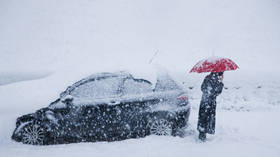Dire winter scenario issued for EU

Reducing dependence on Russian natural gas supply is impossible for the European Union in the coming year without a massive production halt, RBK business daily reported on Monday, citing a study by McKinsey’s former Russian division, consulting company Yakov & Partners.
Their research showed that, despite reports that EU stores are full, the bloc has not yet overcome its reliance on Russian energy and will not be able to get through the coming winter and next year “without maintaining gas supplies from Russia or a [effecting] significant reduction” in consumption.
The report outlined that, in order to meet their needs until the end of 2022, European countries will either have to maintain imports from Russia or reduce gas consumption by an additional seven to 12 billion cubic meters, “which is possible only with a complete or partial shutdown of a number of industries.” The deficit may grow to 20-30 billion cubic meters if China’s demand for LNG recovers or if the winter is cold and long, or in the event of disruptions in supply chains, it adds.
Yakov & Partners indicated that 70% of nitrogen fertilizer production capacities in the EU have already been stopped, aluminum production has been reduced by 25%, and steel production by 5%. The authors of the study suggested that the decline in production is likely to continue “even in the event of a mild winter.”
“In the perspective of 2023, the rejection of Russian gas means a deficit of 40-60 billion cubic meters for European countries even while maintaining the current rate of gas savings for the whole of 2023,” said Elena Kuznetsova, a partner at the company.
She explained that 60 billion cubic meters of gas is comparable to the annual gas consumption of France and Poland combined, or the total annual gas consumption of such industries as fertilizer production, petrochemistry, ferrous and non-ferrous metallurgy, and all engineering. Stopping these industries will further affect other related industries, from agriculture to services, Kuznetsova warned.
For more stories on economy & finance visit RT's business section












